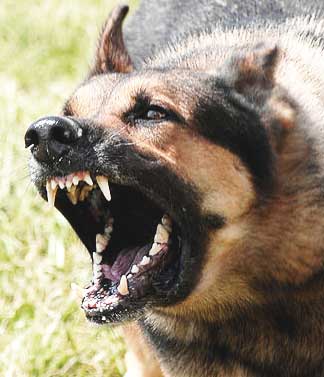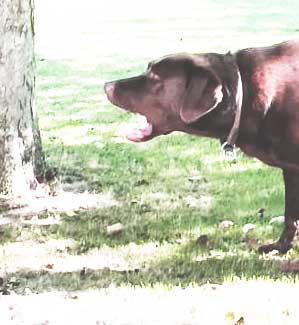If you’re a dog owner, chances are you’ve experienced the frustration of your dog barking in your face. Whether it’s early in the morning or late at night, dog barking can be an incredibly annoying behavior that leaves us feeling helpless and frustrated. But why do our dogs start barking right in our face?
The answer is complex and depends on a variety of factors including breed, environment, age, and health. Dog barking is a natural form of communication for them and they may use it to express excitement or fear; they might also be trying to alert us to something important like danger or potential prey. Whatever their reasons for barking may be, one thing is certain – we need to find ways to reduce excessive dog barking before it becomes too disruptive!
What does it mean if my dog starts barking in my face?
If your dog barks in your face, this could mean a few things. Depending on the breed of your dog, they may be particularly prone to barking in the face as a way to express excitement or fear. This can also be a sign of dominance if your dog is trying to assert themselves over you. It may even indicate an underlying medical condition such as anxiety or fear, so it’s important to visit a vet if you think this may be the case. English Springer Spaniels are notorious for barking.
Dog barking can mean a variety of things depending on the situation. It may be your pet expressing excitement or fear, alerting you to danger or potential prey, or simply trying to communicate with you. It’s important to pay attention and try to understand why your dog is barking so that you can address the behavior accordingly.
How can I stop my dog from barking in my face?
Thankfully, there are several strategies pet owners can employ which will help control excessive dog barking in their homes. Teaching basic obedience commands such as “no” or “quiet” when the dog begins to bark excessively is one approach; providing plenty of physical exercise each day (which helps burn off excess energy) and playing with interactive toys that keep him mentally stimulated are other options.
Establishing regular feeding times and introducing positive reinforcement techniques whenever he displays good behaviors such as not barking can also be beneficial. Ultimately, it’s important to stay patient, consistent with your training efforts, and remember that dogs bark for a variety of reasons – many of which have nothing to do with us!
Why does my dog bark in my other dog’s face?

Barking in another dog’s face is a common sign of dominance or displaying who is the alpha within the pack. This can be especially true for dogs that are highly territorial, possessive or protective of their space. It’s important to be aware of this behavior and intervene if necessary in order to prevent any fights from occurring between your pets.
Understanding why your dog is barking in the face of another is key, as it could simply be a sign of playfulness or excitement. If you believe that this is the case, provide plenty of supervised playtime opportunities for both dogs and keep an eye out for warning signs such as lip-curling, growling, or stiff body posture – all of which can indicate aggression. In addition, ensure that each dog has its own designated safe space where it can go to feel calm and relaxed.
My dog barks in my face constantly?
If your dog is barking in your face, the first step is to assess why this is happening. Understanding the reason behind the behavior can help you determine how best to address it.
One of the most effective ways to prevent this behavior from occurring again is by teaching basic obedience commands such as “no” or “quiet” when the dog begins barking excessively. Secondly, provide plenty of physical exercise each day and play with interactive toys that keep him mentally stimulated. Finally, establish regular feeding times and reward good behaviors such as not barking with positive reinforcement techniques like treats or verbal praise. With patience and consistency, you should be able to reduce excessive barking in your home!
The best way to stop a dog barking in your face is to take the time to understand why the behavior is occurring in the first place. By assessing the situation and employing effective strategies such as providing plenty of physical exercise, teaching your dog basic obedience commands and introducing positive reinforcement techniques, you should be able to reduce excessive barking in your home. In addition, it’s important to remember that dogs bark for a variety of reasons – many of which have nothing to do with us! With patience and consistency, you should have success in curbing your pup’s face-barking habits!
What is demand barking?
Demand barking is a type of behavior where your dog barks in order to get something he wants, such as attention, food or play. This behavior can be difficult to stop as it has become ingrained in the dog and rewards him with what he wants each time.
In order to address demand barking, it’s important to understand the root cause of this behavior and then take steps to eliminate it. For example, if your pet is barking for attention when you’re not paying him any, ignore the barking until he stops. Once he does stop, reward him with verbal praise or a treat so that he learns being quiet brings more rewards than him continuing his bad behavior. It’s also important to provide plenty of physical exercise each day.

Should you ignore your dog if they bark at you?
Ignoring your dog when they bark at you can be an effective way to discourage this behavior. However, it’s important to understand why the barking is occurring in order to find the most effective solution.
For example, if your pup is barking for attention, then simply ignoring him until he stops should do the trick. On the other hand, if it’s due to fear or anxiety, then it would not be appropriate to ignore him as this could only increase his feelings of distress. In such cases, providing plenty of positive reinforcement and rewards when he displays good behavior and refrains from barking can help decrease his anxiousness over time.
What is frustration barking?
Frustration barking is a type of behavior where your dog barks in response to feeling annoyed or frustrated. This could be due to not getting what they want, such as being denied access to something they wanted or if someone interrupts them when they are doing something.
In order to address this type of barking, it’s important to understand why your pup is experiencing frustration and then take steps to eliminate it. For example, ensuring that playtime is interactive and stimulating can help keep him mentally occupied which may reduce his need for attention-seeking behaviors like barking. In addition, providing plenty of physical exercise each day will also help him release energy and make sure he does not become overly bored or frustrated. Lastly, provide consistent rewards for good behavior.
Do dogs think yelling is barking?
No, dogs do not think that yelling is barking. Dogs are capable of understanding the difference between human language and other sounds, as well as verbal vocalizations made by other animals. Therefore, when a human yells at a dog or makes any sort of loud noise, the dog will recognize that it is not barking and respond accordingly.
It’s important to remember that yelling at your pet may cause him to become scared or anxious, which could lead to behavioral problems down the line. If you need to get your pup’s attention or communicate something to him in an effective way, use positive reinforcement techniques such as verbal praise or treats instead. This will help keep your pooch happy and engaged while reinforcing good behavior.
To stop a dog barking and biting for attention, what should I do?
If your pup is barking or biting for attention, it’s important to understand why he is engaging in this behavior and then take steps to eliminate it. For example, if he is barking due to boredom or loneliness, providing plenty of interactive playtime and physical exercise each day can help keep him mentally stimulated and reduce his need for attention-seeking behaviors like barking.
In addition, consistently rewarding positive behaviors with verbal praise or treats will encourage good behavior while discouraging bad behavior. Lastly, ignore the barking until he stops so that he learns being quiet brings more rewards than him continuing his bad behavior. With a little bit of patience and consistency, you should have success in curbing your pup’s face-biting and barking for attention. You could always try a whistle to stop your dog barking.
Do dogs bark to communicate?

Yes, dogs bark to communicate with humans and other animals. Dogs use different types of vocalizations, such as growling or howling, to express their emotions or intentions. Barking is one of the primary ways they let us know when they want something, such as going outside or getting a treat. They also use barks to alert us to potential danger or if something is wrong in their environment. Understanding the meaning behind your pup’s barks can help you better respond to his needs and keep him safe. Additionally, providing plenty of playtime and physical exercise each day can help keep him from becoming bored which could lead to excessive barking out of frustration (as discussed above).
What happens when you bark at your dog?
There have been some discussions on Reddit on this subject when dog owners have found out the answer to this question. Generally, when you bark at your dog, it can have an adverse effect on their behavior. It can cause them to become scared or anxious, which in turn can lead to more aggressive behaviors like barking and biting. Additionally, if you make a habit of yelling at your pup, he may start associating negative experiences with being around humans and people in general.
It’s important to remember that if you need to get your pup’s attention or communicate something to him in an effective way, use positive reinforcement techniques such as verbal praise or treats instead of yelling. This will help keep your pooch happy and engaged while reinforcing good behavior rather than causing fear or anxiety. With a little bit of patience and consistency, you should have success.
How do you stop frantic barking?
If your pup is barking frantically, try to identify the cause of this behavior and then take steps to eliminate it. If he’s barking due to boredom or loneliness, providing plenty of interactive playtime and physical exercise each day can help keep him mentally stimulated and reduce his need for attention-seeking behaviors like barking. Additionally, consistently rewarding positive behaviors with verbal praise or treats will encourage good behavior while discouraging bad behavior.
Lastly, ignore the barking until he stops so that he learns being quiet brings more rewards than him continuing his bad behavior. With a little bit of patience and consistency, you should have success in curbing your pup’s frantic barking. It may also be helpful to enroll your dog in obedience classes. This will help them learn a more consistent set of commands and cues that can be used to communicate with your pup, which could also reduce excessive barking.
To sum up
Whether it’s early in the morning or late at night, excessive dog barking can be an incredibly annoying behavior that leaves us feeling helpless and frustrated. Though it may seem like our furry friends are just being disruptive, they’re actually using their natural form of communication to express their feelings!
Fortunately, there are several strategies pet owners can employ which will help control barking in their homes. These include teaching basic obedience commands such as “no” or “quiet” when the dog begins to bark excessively; providing plenty of physical exercise each day (which helps burn off excess energy); playing with interactive toys that keep him mentally stimulated; establishing regular feeding times so he knows when meals will occur; introducing positive reinforcement techniques. such as treats or verbal praise; and finally, understanding the root cause of excessive barking in order to tailor an appropriate solution.